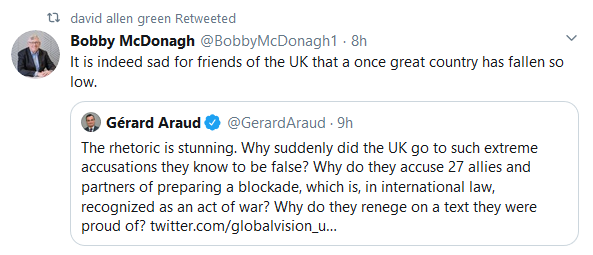A former Irish Ambassador retweeting a former French Ambassador, half in condemnation half in sorrow about the UK government. Once upon a time this would have mattered deeply to any UK government. 

The UK neglect or at times deliberate antongism towards countries of the EU since 2016 has been wholly unnecessary and will in time be quite counter productive. I can recall a Minister (then and now) being rude to a question from a lead Swedish business figure in 2018.
EU countries will always be our neighbours and major trade partner. We'll need things from them. We have absolutely no credit in the bank because ministers and key advisers have treated them with contempt, leaving diplomats to try to pick up the pieces.
And of course there are knock on effects, because who knew EU countries talk to others? Like Ireland talking to the US. Or every country that wants to do business with the EU. Maybe slowly, but you can't be global Britain while being gratuitously rude to the neighbours.
And I think to rebuild relations with the neighbours those in the UK obsessed with the failures of the EU are going to have to become marginal (just like if there's a Labour government those obsessed with US failings). Don't see it happening any time soon sadly.
But but but there are votes in "they're on the side of the EU"...
Tough challenge for Labour because blatant nationalism like this has an audience.
But not in Scotland. Not in international business. Not in diplomacy.
Tough challenge for Labour because blatant nationalism like this has an audience.
But not in Scotland. Not in international business. Not in diplomacy.
https://twitter.com/Conservatives/status/1305620168857485312
Small practical example. Liam Fox did not vote for the government yesterday, presumably it isn't a good look for a wannabe DG of an international organisation to vote for legislation saying we don't have to follow the rules of that organisation.
https://twitter.com/DavidHenigUK/status/1305434608813707264
This Prime Minister will think it is a game, that he can threaten the EU then treat them as if nothing untoward really happened. And those leaders will smile and exchange pleasantries. And then hope they have a chance to undermine him. At least it isn't real war.
Those queues are going to be longer without EU cooperation... theguardian.com/politics/2020/…
Some UK sources are claiming the threat to breach international law is helping EU talks, which of course is what they hope. But in Brussels this kind of conversation appears to be more common. No deal without UK backtracking.
https://twitter.com/FabianZuleeg/status/1305767333248589825
And here's an even stronger take from within the EU policy community. This is what people are saying about the UK. Does this matter to us? It should.
https://twitter.com/NvOndarza/status/1305766784700764160
• • •
Missing some Tweet in this thread? You can try to
force a refresh




